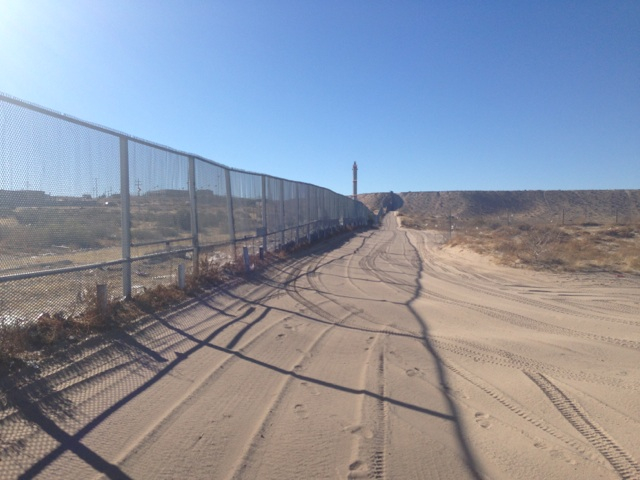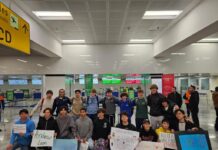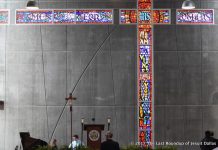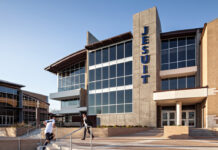When you think of the border situation with Mexico, what do you think of? Poverty, violence, drugs? For many, it’s a distant issue that you’ll talk about in a Social Justice class and never really commit a lot of thought to since it seems so far away.
Taking a trip to El Paso to show people what the issue of immigration is really like, Mr. Stephen Pitts, S.J., a Jesuit geometry and algebra teacher, looked to help out the people there and also open the eyes of the volunteers. The Sacred Heart Parish in El Paso, where the group was staying, has undergone a recent pastor change, thus delaying the trip. Four blocks away from the border with Mexico, Sacred Heart is the only Jesuit parish in El Paso. This year, the group that travelled to El Paso included 13 students, Mr. Jack Fitzsimmons, Mr. Pitts S.J., and Mr. Rich Perry. This year, they visited from Jan. 15-19.
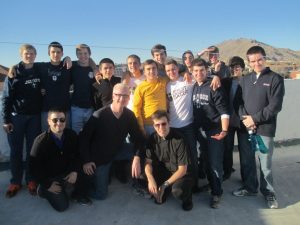 He stated that the main goal of the trip was to “help the students have some concrete experiences so that when the issue of immigration comes up in their theology or social justice classes, they’ll have something more than what they have read or heard.” Mr. Pitts went on to say that “immigration is a very important issue and will continue to be an important issue in the U.S. The Catholic Church and the U.S. are also changing a lot because of the Hispanic immigration.” Mr. Pitts explained that the trip’s goal is to “expose the students to the situation on the border.”
He stated that the main goal of the trip was to “help the students have some concrete experiences so that when the issue of immigration comes up in their theology or social justice classes, they’ll have something more than what they have read or heard.” Mr. Pitts went on to say that “immigration is a very important issue and will continue to be an important issue in the U.S. The Catholic Church and the U.S. are also changing a lot because of the Hispanic immigration.” Mr. Pitts explained that the trip’s goal is to “expose the students to the situation on the border.”
For Joe Hall ’16, one of the four sophomores to go on the trip, the trip allowed him to form his own opinion about the border after looking through multiple perspectives. Hall explained that “the issue of immigration and all that goes along on the border is a huge issue that we don’t often hear about in the media. It’s kind of downplayed as ‘Oh, there’s a bunch of drug violence and stuff like that,’ but there’s a lot of suffering and oppression and people, who are very good people, who are working to fight against all those things.”
Hall went on to describe his experience on this trip, “The first full day you got a lot of up-close, first-hand experience of the suffering along the border and the institutions that help to fight that… We went to a farm workers center and learned the struggle in the life of the migrant farmworker and went to something called the Annunciation House, which houses undocumented immigrants who’ve crossed through the desert. We visited St. Pius, which is a mission that helps 60,000 unaccompanied children that come across the border every year. We got to meet up with a group of students which were about ten, they would cross the border all by themselves, they had no idea who their parents were, or where they are. We just got to, you know, educate them, color with them, sing, and dance.”
Mr. Perry summarized the trip as a experience of “incredible awareness.” For Perry, this was his first time to attend in the three-year history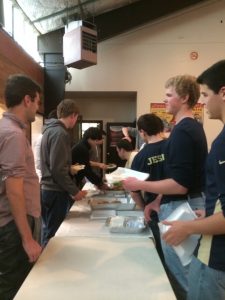 of the trip to El Paso. Perry added that “the issues we read about before the trip became tangible and real human beings right in front of us. We didn’t have to ask questions and search for some philosophical answer; we could ask questions to people on the border and find out ‘What is your reality?'” Perry first decided to go on the trip because he “had heard from a lot of previous students that went on the first two trips to El Paso that it was an amazing experience and it was something that was very formative for them.”
of the trip to El Paso. Perry added that “the issues we read about before the trip became tangible and real human beings right in front of us. We didn’t have to ask questions and search for some philosophical answer; we could ask questions to people on the border and find out ‘What is your reality?'” Perry first decided to go on the trip because he “had heard from a lot of previous students that went on the first two trips to El Paso that it was an amazing experience and it was something that was very formative for them.”
Although the trip gave him “a hundred” experiences to remember, Perry chose one experience that stuck out to him saying, “Approaching the fence in a small town on the Texas side of the border, and being able to shake hands with people on the other side of the border and being able to touch their reality. Also, having them touch our reality and our humanity,” Perry pauses for a moment, “I could feel the presence of God.” Mr. Perry concluded sharing his experiences by saying, “The students that went on the trip get to bring that experience back into the Jesuit community, and as these young men become adults, they will never be able to divorce themselves of this experience.”
Mr. Pitts explained what the trip means to him personally, “As a Jesuit novice, I did many different ‘experiments’, as they’re called, but it was very significant. I spent four months in Tijuana [in] the Franciscan soup kitchen and I just felt very touched by the stories of the people that I met there. Of course, I want to be a priest in the Catholic Church in the U.S. and there are more and more Hispanics, so that makes them an important part of the ministry of the church.” Mr. Pitts went on to say that “the most interesting activity is to meet people who are affected by the border situation, to hear their stories, and to realize that they’re just like us… and that’s the goal; to turn it from something abstract into something personal.”
To apply for the trip, a student must fill out an application telling why he wants to go on this trip, what he thinks he would learn on the trip, and how it would be beneficial to him. The Jesuit Student Council actually funds a good chunk of the trip, however the student must contribute $500. Financial aid is also available. If you are interested in attending the trip, feel free to contact Mr. Pitts about going on the trip next year.


